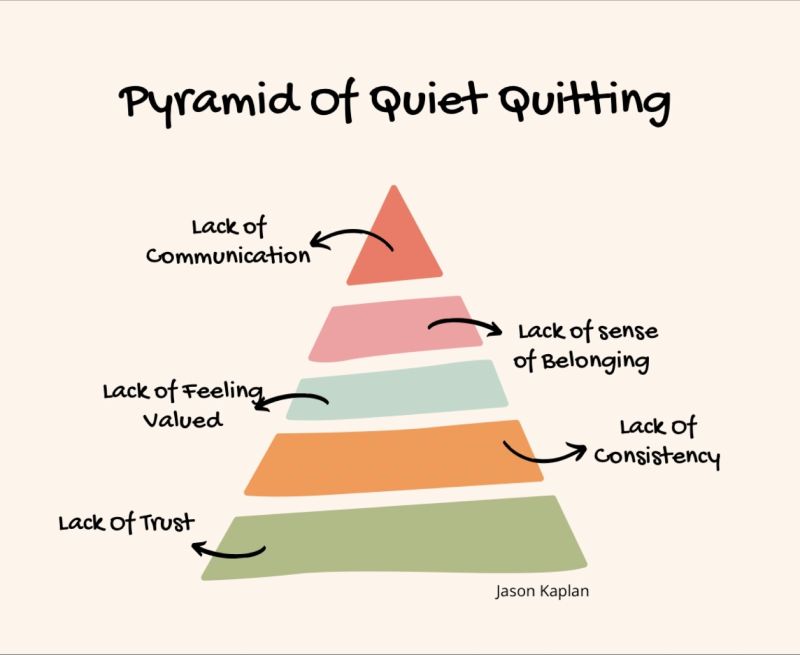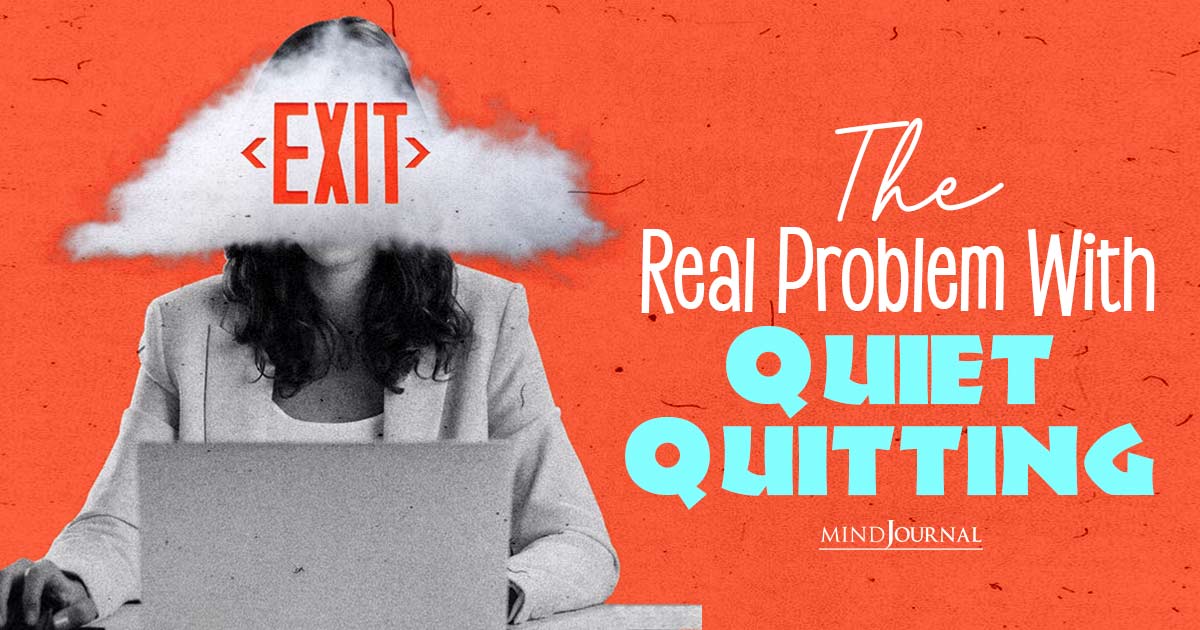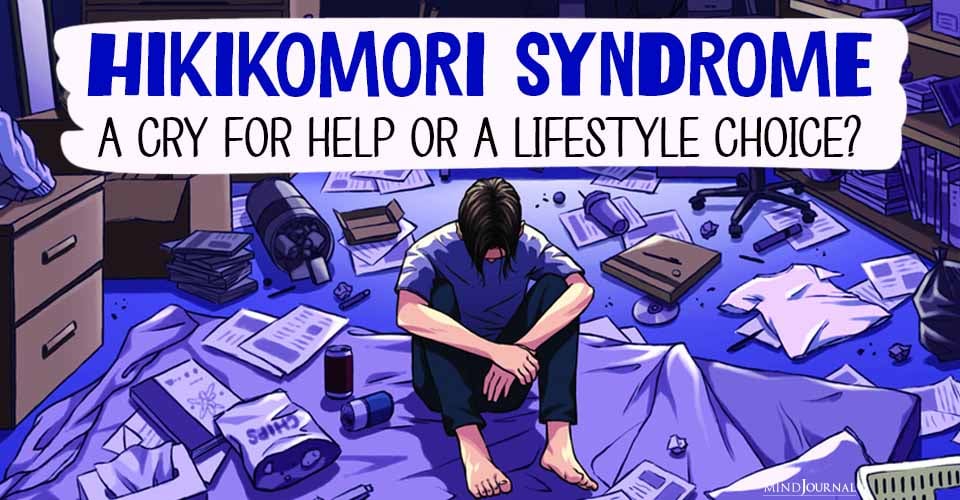What is quiet quitting? What does quiet quitting mean, and why is there so much concern about quiet quitting among employers? Read on to know more about this new global practice that seems to be gradually taking over every workplace in the world.
Key Points:
- Quiet quitting is a dangerous misnomer; essentially, the concept just refers to working normal hours.
- Employee enthusiasm, engagement, and extra time are now not just taken for granted but also expected in many companies.
- Engagement beyond our contractual obligation is a gift that needs to be earned.
Quiet quitting has generated a flurry of headlines in 2022. Results of a 2022 Gallup survey suggest that at least half of the U.S. workforce identify as quiet quitters. A trending catchphrase, it has clearly hit a nerve, appealing to both exhausted workers and worried CEOs, who see the phenomenon as a root cause of many of their problems.
However, the concept is a dangerous misnomer. And because the notion of quiet quitting is so misleading, what’s really going on in the world of work has largely remained unnoticed.
Related: Quiet Quitting: A Mental Health Movement Or An Anti-Work Movement?
What Quiet Quitting Means?
Quiet quitting was coined in March 2022 by Bryan Creely, a corporate recruiter turned career coach. Creely’s TikTok video on the subject went viral, and the concept has been bandied around ever since.
Yet contrary to what the name suggests, quiet quitting doesn’t refer to people actually or secretly quitting their jobs. And neither does it refer to people stopping to do their jobs while they are physically present at work.
Instead, it denotes a reduction in the amount of effort we put into our work. Even more specifically, it means that people simply do what is specified in their job description, but stop taking on what is above and beyond.
In other words, quiet quitting refers to working normally: doing exactly what we are contracted and paid to do, neither more nor less. Some commentators even suggest that workers who work to contract in this way are merely refusing to succumb to a common form of wage theft.

Consider these examples of two workers who identify as quiet quitters and who have been interviewed by NPR. They in no way sound like Big Lebowski types, Bartlebies, or fervent union activists, but simply like normal people who continue to do their jobs but have put up some healthy boundaries to protect their work-life balance.
Administrative assistant Christy G explains: “I do not interact with anything from work before 7:00 or after 4:30, which is the time my office is open. I work in a corporate setting so my tasks are not life or death. If someone asks for something, like maybe a file scanned or something like that, at the end of the day—it can wait until the next day.”
Department manager Sara M. reports: “I now leave my office at the end of the day not thinking about what I need to work on when I go home at night. I set boundaries for checking my emails and reaching out to co-workers during non-office hours. Most importantly, I do not feel any bit of anxiety when it comes to requesting time off, taking personal days, or especially taking sick time.”
Of course, what looks like a completely healthy development to us is nevertheless worrying to employers who not just rely but quite literally bank on their employees regularly taking on the “above-and-beyond” tasks for free.
Employees who take on extra work and work excessively long hours usually expect other kinds of less-tangible rewards: They may wish to signal ambition, be considered “good citizens,” gain promotions, secure positions that may be precarious, or simply be decent and nice colleagues who wish to be supportive and good team players.
When a growing number of the workforce stops taking on goodwill tasks that are in the gray zone, that will of course impact productivity, sales, or the quality of services in various ways.
Related: 5 Signs of Workplace Burnout
The Real Problem
And here is the real problem: The concern about quiet quitting signals just how normalized the extra engagement of workers has become. In fact, it has become so ubiquitous that it is taken for granted.
Elon Musk’s recent message to Twitter employees telling them to grind until they drop is only a more explicit case in point. Musk wrote that anyone who wants to remain employed at his company needed to be “extremely hardcore,” “working long hours at high intensity. Only exceptional performance will constitute a passing grade.” That message did not land well with his already hard-working workforce.
What’s more, it is one thing for the owner of a company to work 100-hour weeks if they feel that their personal fortune is on the line and quite another to expect his employees to follow suit.
Why should they? Grind-and-hustle cultures, and “last-out-of-the-office wins” contests are increasingly being seen for what they are: toxic.
Employers see quiet quitting as a manifestation of worker dissatisfaction, burnout, and lack of engagement. In China, a similar phenomenon became known as “lying flat,” and the new catchphrase is also often discussed in conjunction with the Great Resignation.
But all of that, too, is misleading. Quiet quitting should simply be called “working normally” because this is what it is. The real problem is the horizon of expectations of employers, who have taken our extra engagement for granted for far too long. It shouldn’t be. Enthusiastic engagement is our gift to give, and our gift to withhold.
What we are currently witnessing, then, is merely a much-needed correction, a slow emancipation from a dominant cultural narrative about work that has become old and bitter.
For far too long, we have bought into the myth that only work can give us meaning, purpose, and status; that work is intricately tied up with our identities and our value; that work equals self-realization; and that it might hold the key not just to financial but even to spiritual salvation of some kind.
However, for millennials especially, the “just grind” and the “do what you love” mantras have not delivered on these promises. Saddled with unprecedented student debts, they are the first generation that is economically less well-off than their parents.
And many others, too, are waking up to the fact that our work is not all there is to us, that truly good and fulfilling lives are marked by balance. Perhaps most importantly, many of us are realizing that, if we are not careful, working too hard can make us ill.
Chronic work-related stress caused by constant overwork is rightly beginning to be seen again not as something we should celebrate and normalize, but as something that can be as harmful to our health as tobacco, alcohol, and loneliness.
Related: ‘Bare Minimum Monday’: Exploring The Gen-Z Work Culture TikTok Trend
If employers want our extra engagement, the onus is on them to convince us that this engagement is deserved and that it is a good investment of our time and care. It cannot simply be expected.
For, after all, at some level work is just work—a contractual agreement between two parties, that, ideally, should be a win-win. We give a pre-agreed amount of our time, attention, and skills, and we get a paycheck for it. Anything beyond that is a bonus that needs to be earned—especially our enthusiasm and engagement.
We may well feel called upon to be more engaged and to gift more of our time—because we believe in a particular project or mission because we care deeply about the people with whom we work or for whom we provide services, or because we truly enjoy problem-solving the challenges that work provides us.
But the bottom line remains: This kind of engagement is our gift to give, not something that can be taken for granted. It is up to employers to convince us that they deserve the gift of engagement, and it is up to them to put structures and incentives in place to change our minds.
If you are interested in being coached by Anna, please get in touch with her via anna@exhaustion-coach.com or book a free 30-minute exploration call with her here (https://calendly.com/the-exhaustion-coach/free-coaching-exploration-call). You can find out more about her and her coaching philosophy here (www.the-exhaustion-coach.com).
Written By Anna Katharina Schaffner Ph.D. Originally Appeared On Psychology Today










Leave a Reply